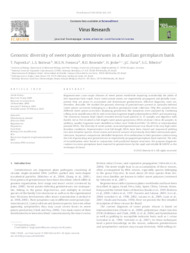Genomic diversity of sweet potato geminiviruses in a Brazilian germplasm bank.
Genomic diversity of sweet potato geminiviruses in a Brazilian germplasm bank.
Author(s): PAPROTKA, T.; BOITEUX, L. S.; FONSECA, M. E. N.; RESENDE, R. O.; JESKE, H.; FARIA, J. C.; RIBEIRO, S. G.
Summary: Begomoviruses cause major diseases of sweet potato worldwide impairing considerably the yields of this important food staple. Since sweet potato plants are vegetatively propagated and globally transported, they are prone to accumulate and disseminate geminiviruses. Effective diagnostic tools are, therefore, desirable. We studied the genomic diversity of geminiviruses present in naturally-infected sweet potato accessions belonging to a Brazilian germplasm bank collection. Fifty-five samples from different sweet potato accessions displaying geminivirus-like symptoms were analyzed by combining rolling circle amplification (RCA) with restriction fragment length polymorphism (RFLP) and sequencing. The restriction enzyme MspI (HpaII) revealed diverse band patterns in 55 samples and digestion with BamHI, SstI or PstI resulted in full-length sweet potato geminivirus DNAs of about 3 kb in 46 samples. In addition, smaller fragments were identified as either viral ?Defective DNAs? (D-DNAs) or mitochondrial plasmid DNAs. The diversity of sweet potato-associated geminiviruses was found to be very high under Brazilian conditions. Representative viral full-length DNAs have been cloned and sequenced yielding two new tentative species, three strains and several variants of previously described sweet potato geminiviruses. Sequence comparisons identified footprints of recombination in their genomes underscoring the risk of generating new geminiviruses in vegetatively propagated germplasm bank material. The sites of recombination were found in conjunction with predicted hairpin structures. We propose diagnostic routines to screen germplasm bank material for geminiviruses by the rapid and reliable RCA/RFLP as the technique of choice.
Publication year: 2010
Types of publication: Journal article
Observation
Some of Embrapa's publications are published as ePub files. To read them, use or download one of the following free software options to your computer or mobile device. Android: Google Play Books; IOS: iBooks; Windows and Linux: Calibre.
Access other publications
Access the Agricultural Research Database (BDPA) to consult Embrapa's full library collection and records.
Visit Embrapa Bookstore to purchase books and other publications sold by Embrapa.

